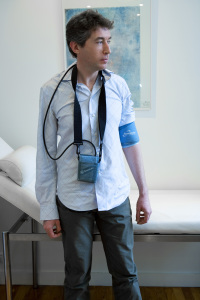What is ambulatory blood pressure recording?
In patients who suffer from high blood pressure, it is essential to diagnose whether the blood pressure readings are truly elevated or whether it could be what is called ‘white-coat hypertension’ (white-coat hypertension is a rise in blood pressure due to apprehension regarding seeing a doctor). In such patients, an ambulatory blood pressure monitor may be attached to record the blood pressure readings over a period of 24 hours. This provides a more realistic picture regarding the patient’s blood pressure while they are at work or in the comfort of their own home.
How is it performed?
The procedure is fairly straightforward and involves the placement of a blood pressure cuff around the upper arm. This blood pressure cuff is then attached to a small device that is hung around the shoulder. This device inflates blood pressure cuff 24 times over 24-hours (once every hour). Once the device is attached, the patient can wear their regular clothing over it and carry on with their normal daily routines.
The image below should give you an idea of how the device looks. Please note that you can wear your clothes over the device and carry on with your daily activities. The device will not be obvious to individuals nearby.

No special preparation is required for patients to undergo this test. If patients are taking medication for blood pressure or for any other condition, they are requested to continue doing so and do not stop their treatment. Patients are also requested to have a bath before the device is fitted, as it cannot be removed until the test is complete 24 hours later.
Once the test is complete, the device is returned to our centre and the information is downloaded. A report is usually available straight away or within 24 to 48 hours.
What information does the test provide?
Ambulatory blood pressure monitoring is a good test to assess blood pressure changes throughout the day when at work or at home and also at night when asleep. A constantly elevated blood pressure over and above the normal range which persists even at night is indicative of underlying hypertension.
This test also helps assess a patient’s response to blood pressure medication. For example, if patients have been commenced on a number of different tablets to control their blood pressure, and their blood pressure remains high when they come to see a doctor, then performing this test can help assess the true blood pressure readings when the patient is at home.
The ambulatory blood pressure monitor records the upper and lower limits of blood pressure throughout the day and offers an average blood pressure reading as well. The report will also indicate the amount of time during the 24-hour period that the blood pressure remains elevated.
In patients who have normal blood pressure, there is usually no significant alteration during the day or at night. However, in patients who have hypertension, there may be an excessive fall in blood pressure at night or the blood pressure may remain persistently elevated above the normal range. This aids a diagnosis of hypertension.
Is the test painful?
This test is non-invasive and does not involve any needles or sharp objects. The blood pressure cuff will inflate and deflate a number of times during the day and this can feel like a tightening around the arm which last for only a few seconds. Though this may be slightly uncomfortable, it does not cause any significant pain to the patient.
Limitations
While ambulatory blood pressure monitoring is an excellent test, sometimes readings may be fairly variable in patients and may not offer sufficient information to the doctor regarding their true blood pressure. In addition, some patients find that the tightening of the cuff around the arm when BP recordings are being taken can disturb the sleep at night. In patients who have irregularities of their heartbeat, readings may not be totally accurate.
- Understanding Iron Deficiency Anemia: A Guide for Patients - May 31, 2025
- CT Coronary Calcium Score: A Guide for Patients - January 7, 2024
- Gastric Antral Vascular Ectasia (GAVE) – Causes, Diagnosis, and Treatment - August 5, 2023
